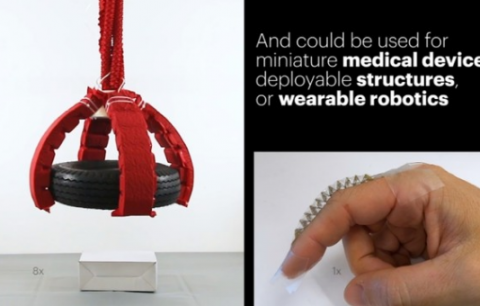
Reuters — US researchers have developed strong origami-inspired artificial muscles that can allow soft robots to lift objects 1,000 times their own weight using only air or water pressure.
The team from Massachusetts Institute of Technology Computer Science and Artificial Intelligence Laboratory (MIT CSAIL) and Harvard’s Wyss Institute published their findings on Monday (November 27) in scientific journal Proceedings of the National Academy of Sciences (PNAS).
According to a joint press release, “each artificial muscle consists of an inner ‘skeleton’ surrounded by air or fluid and sealed inside a bag of ‘skin,’ both of which can be made from a variety of materials. A vacuum applied to the inside of the bag initiates the muscle’s movement by causing the skin to collapse onto the skeleton, creating tension that drives the motion.”
The movement of the muscles are determined by the skeleton’s shape and composition. No power source or human input is required.
Researchers made dozens of muscles using materials such as packing foam, metal springs, and sheets of plastic. Using knowledge of origami they created muscles able to contract to 10 percent of their original size simply by sucking the air out.
One muscle weighing just 2.6 grams was able to lift a 3 kilogram object. The researchers say this is the equivalent of a duck lifting a car.
“A single muscle can be constructed within ten minutes using materials that cost less than $1, making them cheap and easy to test and iterate,” said the release.
Future applications include minimally invasive surgery, deep sea research, and space exploration.








